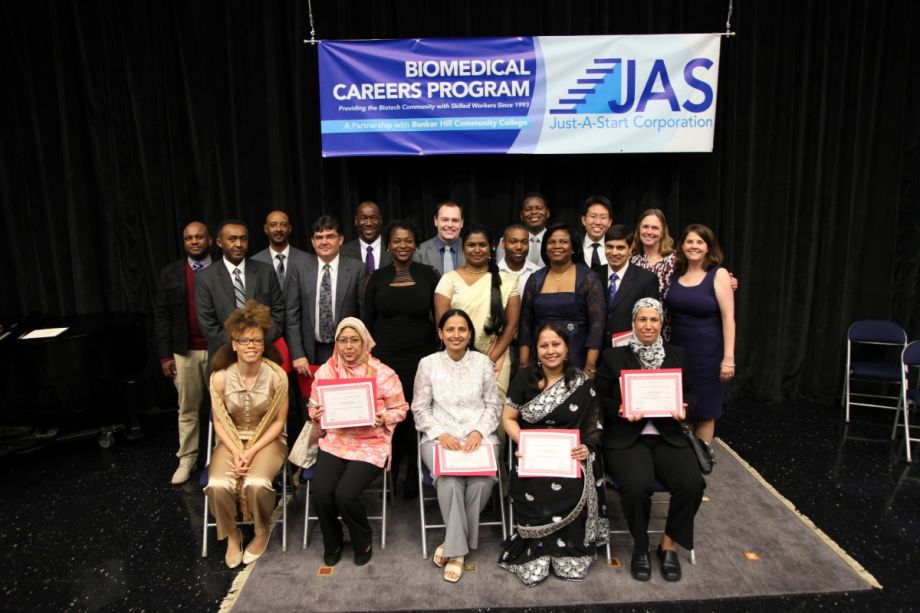In 2001, Steven Jones walked into the Cambridge Biomed Careers training classroom, 42 years old and unemployed. He had been out of school for 24 years, and had worked in customer service for nearly that long before being laid off. Jones knew nothing about biomedicine, and he knew nobody in the industry. Today, Jones holds the title of lead protein purification technician at Shire Pharmaceuticals.
In a time of skills gaps and hollowed-out middle-class jobs, Jones’ story plays out almost like how we dream it would. Here is someone whose previous work was being outsourced to overseas, and who had no connections or entrée into the knowledge economy. Through training and education, he was able to secure a stable career in pharmaceutical manufacturing — blue-collar work adapted for the new age. Jones’ experience serves as an instructive example of what it takes to successfully leverage high-growth industries to benefit lower-income residents.
The Biomed Careers Training Program is run by Just-a-Start, a local non-profit offering a broad range of services. It was established in 1992 in response to the burgeoning biotech sector in Cambridge and Greater Boston. As an early attempt to tailor workforce training and economic development to specific regional strengths, the program was really ahead of the curve at the time.
In the past 22 years, it has carved out a small but successful niche for itself. The half-classroom, half-lab course prepares students for a variety of positions, but is especially geared toward the day-to-day lab work of pharmaceutical manufacturing. It accepts 20 to 30 students per year, and boasts a 77 percent placement rate in biomedical, including with nearby industry giants like Genzyme and Novartis. Average starting salaries for the most recently placed graduates is $35,000, with benefits and career advancement opportunities.
Compared to similar types of courses offered at community colleges, the program enjoys a distinct advantage by being only nine months long, five hours a day, for five days a week. This helps low-income individuals find jobs fast, while also allowing them to work while going to school.
The program is also free and funded completely through grants. A portion of the funding comes from the City of Cambridge, and so about 10 seats are reserved for residents of the City of Cambridge. Individual Training Account (ITA) funds from the federal Workforce Investment Act cover some of the others, and JAS works to raise private funds to maintain the program.
The size of the program is certainly a limitation, as the demand for the program far outstrips its capacity. Every year the program receives about 200 solicitations for the 20 to 30 spots. The students are mostly low-income residents from the immediate area, and they take basic tests in reading and mathematics and go through a personal interview. Many accepted students are immigrants who might have had some relevant education in their home countries. But while prior knowledge is helpful, it is not required. According to Jennifer O’Donnell, the director of the program, the best candidates have been defined by their maturity, persistence and fit for the day-to-day labor of the industry.
In many ways, the program works because of the small class size and the personal support that allows. “Since the downturn, we’ve found our students competing more and more with candidates with bachelor’s degrees for the same jobs,” said O’Donnell. “Our longtime presence, relationship with employers in the area, and network of more than 400 alumni are essential in connecting graduates with job opportunities.”
Indeed, the success of the program seems to depend greatly on the specific characteristics of Cambridge, the thriving biotech and healthcare sectors, and the support infrastructure of the immediate area. “The Biomed program was possible because we were very uniquely situated,” said Deborah Ruhe, the executive director of Just-a-Start. Carefully cultivated relationships with local employers and the continued strong job growth projections of the Greater Boston area cannot be so easily approximated elsewhere.
More than that, the favorable circumstances of the Biomed program also raise the question of what other requirements a community must fulfill before it has a good shot at this kind of economic development. Cambridge has good job prospects, but it also has generous government funding, established non-profit organizations, high-quality affordable housing, safe neighborhoods and good schools. It’s no coincidence that in addition to workforce training, Just-a-Start is very involved in housing development, homeowner assistance and youth-building initiatives.
For a training program to be more than a training program but a step on the path to real upward mobility, it takes a combination of social and economic factors working in tandem. In a way, what the Cambridge Biomed program really shows is just how many things need to go right.
The Equity Factor is made possible with the support of the Surdna Foundation.
Jefferson Mao is an urban planning graduate student. He blogs sporadically at Flushing Exceptionalism.

















